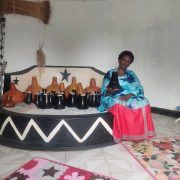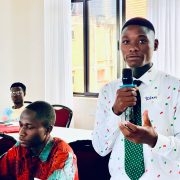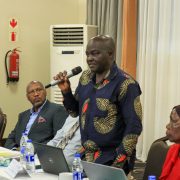Launch of the research report and dissemination of findings
Today, the Cross-Cultural Foundation of Uganda is joined by representatives of civil society organisations, government, UN Departments and the media to launch reports and disseminate findings of a research study that was conducted in 2019 under its Gender and Culture Programme to establish the role of culture in promoting the rights of women and girls and promotion of sexual and reproductive health rights, and access to justice.
The role of culture in promoting women’s and girl’s rights
Relevant cultural resources.
The research unveiled across the board a number of culturally-rooted practices with attendant values and principles that inform them, that play significant roles in curtailing VAWG, as well as promoting SRHR. These include folklore (idioms, songs, proverbs, etc) which promote values that discourage violence and the abuse of women’s rights (as culturally understood). Practices (usually the responsibility of elders, aunts and uncles) that groom young people into responsible adults and provide them with reproductive education; traditional marriage practices, prohibitions that relate to the treatment of pregnant women to ensure safe maternal and child health, medicinal prescriptions and resource persons such as traditional birth attendants.
Restorative justice
Despite the abolition of the judicial function of cultural leaders by the National Constitution (other than in matters concerning customary land tenure), the leaders of the different cultural communities under study still actively provide access to judicial services. Cultural judicial structures operate alongside the government system and cross-references occur. Family related cases, such as domestic violence and land disputes, are commonly handled by elders or clans. Culturally defined sanctions often provide an effective deterrent, much as they are often against the law.
Women in leadership.
Women have an important role to play in ensuring the enjoyment of rights in a violence-free environment for women and girls. Decision-making by women in the family and community context is usually respected and supported by various cultural values and practices. Although the traditional justice system is male dominated and men’s decisions cannot normally openly be contested, women often contribute to the decisions indirectly by proffering advice that is usually much respected
Recommendations
Appreciating culture.
Development actors and government institutions: The entry point into dialogue on VAWG, SHRH and access to justice needs changing by first focusing on the positive aspects of culture. In the light of the continued high prevalence of gender-based violence and reproductive health rights concerns, the various “Strategic guidelines / royal pronouncements on addressing socio-cultural norms, practices and values that impact on HIV AIDS prevention, maternal ill-health and gender-based violence” should be reviewed in the light of findings from this research.
Making use of positive cultural resources
Government institutions should mainstream the positive cultural values and practices in their development plans, strategic documents, programmes and projects, and other guiding instruments, thus placing public messages and other initiatives within a framework that is recognised and understood by the bulk of the population.
Judicial functions of cultural leaders need to be recognised and harmonised as necessary, beyond the current provisions for restorative justice as stipulated in the National Transitional Justice Policy (2019). A more synthesized and comprehensive approach to justice could thus be promoted, thereby enhancing access by women and girls to forms of legal redress that are accessible and understandable in their cultural contexts.
‘Re-energizing’ positive cultural resources
Cultural institutions should take a lead role in championing a cultural renewal and a return to the ‘cultural ways of doing things’, so that they revive the respect and confidence of communities in their cultural identity and in values
Re-education and dissemination
Cultural institutions need to re-educate their constituencies about the existence and significance of the positive cultural values, norms and practices, as identified by this project, that can facilitate the reduction of VAWG and other rights abuses, as well as the role of traditional justice systems. They should also widely publicise the positive cultural practices and values described in this report to the youth, to raise awareness and appreciation.
Development partners need to promote “cultural literature”, with its idioms and positive practices through booklets and films for the youth; appropriate cultural education in schools should also be actively promoted, in line with Government’s proposed strategy for reproductive health education.
Tackling cultural values and practices with negative consequences
Cultural leaders need to reflect on the aspects of culture that are considered to have a negative impact on VAWG, SRHR and to be encouraged to reform them in line with national and international human rights standards. They need to be given the necessary knowledge and confidence to call regular clan
“Cultural re-engineering”: the practice of widow inheritance which has been reengineered in many locations after the HIV/AIDS pandemic to retain its symbolic and socially useful elements (support to the welfare of orphans, identification of a guardian to protect the rights of the family, etc.) while prohibiting its harmful practices – such as forced sexual relations – provides an example of useful evolution. Wherever possible and necessary, one should therefore aim at ‘new cultures’ that find their foundation in what people already know.
Support to cultural institutions.
Local governments and development partners should train, support and actively seek the active collaboration of cultural institutions in designing and implementing development initiatives, thus enhancing the sustainability and ownership of any intervention.
CCFU and its work on Culture and Gender
In 2016, CCFU with support from Diakonia Uganda conducted research that established the existence of culturally defined rights of women and girls among the Acholi and Lango people of northern Uganda respectively.
CCFU conducted research in the districts of Gulu, Kitgum, Pader, Lamwo, Lira and Alebtong. The research findings revealed wealth of positive cultural resources (values, practices, norms, principles, structures) that can be used to promote the rights of women and girls.
Building on the experience from Acholi and Lango, CCFU is implementing a project (Culture for Her) that focuses on harnessing cultural resources to end violence against women and girls and promote their sexual reproductive health rights.
The project is partnership with the Ministry of Gender Labour and Social Development, five cultural institutions of Alur, Buganda, Busoga, Karamoja and Tooro with support from UN Women.







